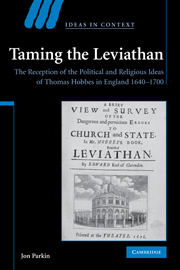 Taming the Leviathan
Taming the Leviathan Book contents
- Frontmatter
- Contents
- Acknowledgements
- Introduction
- 1 Reading Hobbes before Leviathan (1640–1651)
- 2 Leviathan (1651–1654)
- 3 The storm (1654–1658)
- 4 Restoration (1658–1666)
- 5 Hobbes and Hobbism (1666–1675)
- 6 Hobbes and the Restoration crisis (1675–1685)
- 7 Hobbism in the Glorious Revolution (1685–1700)
- Conclusion
- Bibliography
- Index
- Ideas in Context
4 - Restoration (1658–1666)
Published online by Cambridge University Press: 05 May 2010
- Frontmatter
- Contents
- Acknowledgements
- Introduction
- 1 Reading Hobbes before Leviathan (1640–1651)
- 2 Leviathan (1651–1654)
- 3 The storm (1654–1658)
- 4 Restoration (1658–1666)
- 5 Hobbes and Hobbism (1666–1675)
- 6 Hobbes and the Restoration crisis (1675–1685)
- 7 Hobbism in the Glorious Revolution (1685–1700)
- Conclusion
- Bibliography
- Index
- Ideas in Context
Summary
POLITICAL AND RELIGIOUS THOUGHT 1658–1660: COVERT HOBBISM AND ANTI-HOBBISM IN THE SETTLEMENT CRISIS
Cromwell's death in September 1658 led to a period of political instability that provoked an outpouring of discussion about the political and religious direction of the state. Richard Cromwell, mistrusted by both the army and the republicans found it difficult to hold together the various interest groups on which the stability of the regime depended. Beset by debt he was forced to call the third Protectorate Parliament in January 1659, but its attempts to reduce the powers of the army led to its dissolution in April and the recall of the Rump, re-establishing the Commonwealth until the army again dissolved it in October. The army's Committee of Safety in turn dissolved itself in December, leaving England ungoverned until troops restored the Rump and, in February, General Monck restored the Long Parliament, paving the way for the Restoration of Charles II.
This difficult period proved to be remarkably fertile in terms of political theory; between the ending of the Protectorate and the re-establishment of the monarchy there was a window of political opportunity and the chance to lobby for a new political order. There was also the danger of anarchy, and a need to provide some sort of political and religious stability. In these circumstances Hobbes occupied an unusual position.
- Type
- Chapter
- Information
- Taming the LeviathanThe Reception of the Political and Religious Ideas of Thomas Hobbes in England 1640–1700, pp. 200 - 237Publisher: Cambridge University PressPrint publication year: 2007


